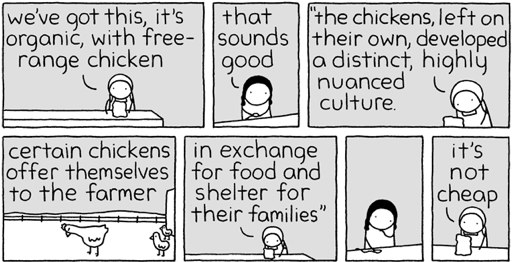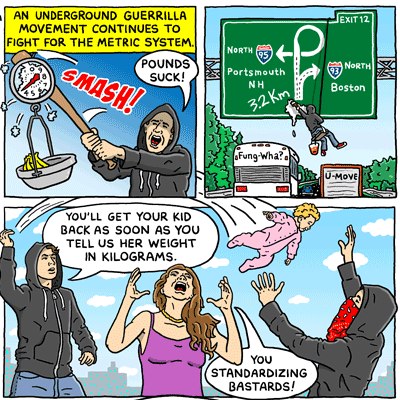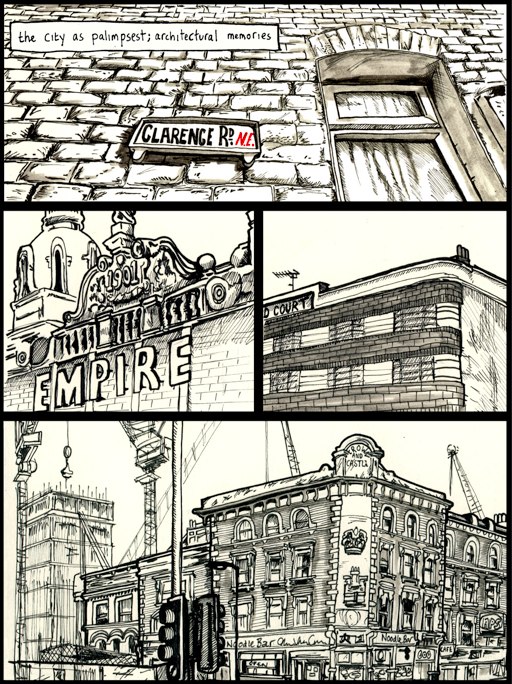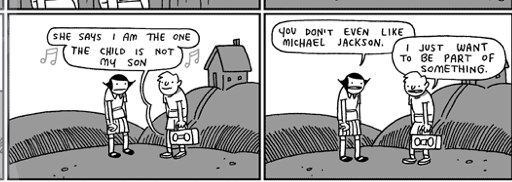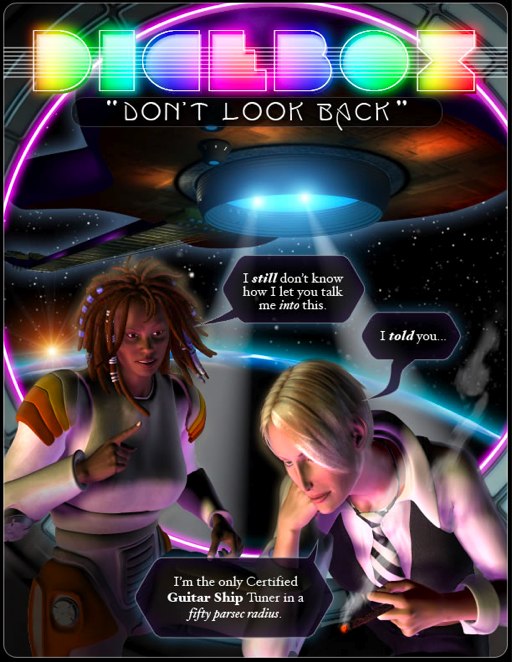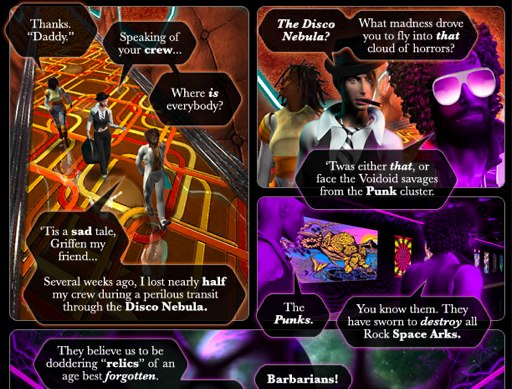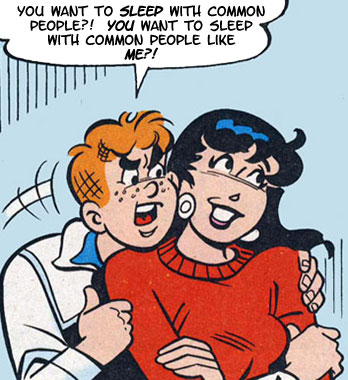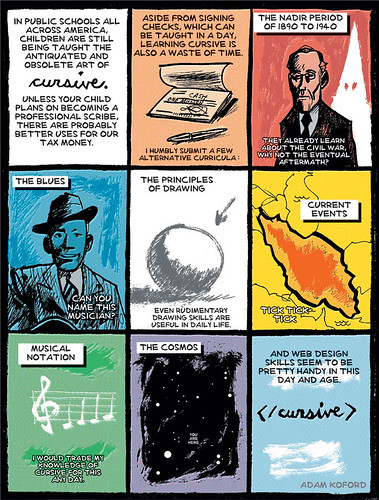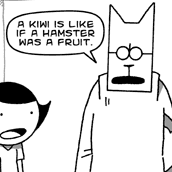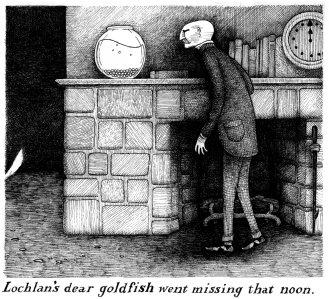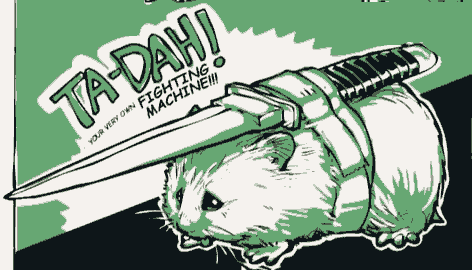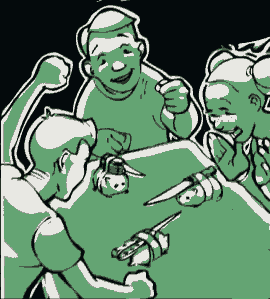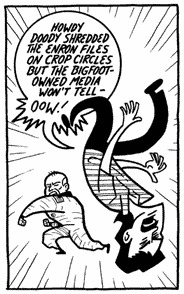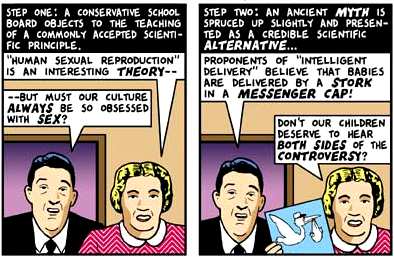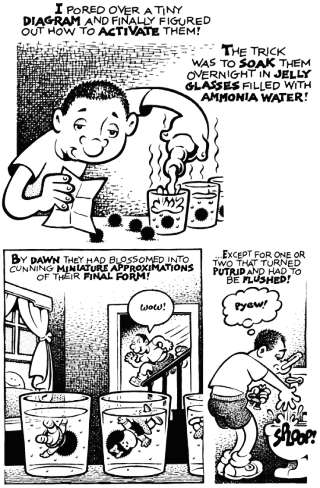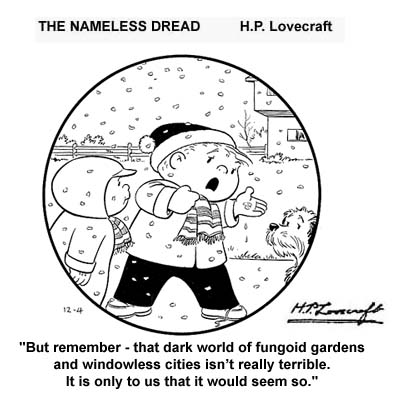The Null Device
Posts matching tags 'comics'
2013/6/20
It seems that yesterday quite a few notable people died; among them:
- Kim Thompson, co-founder of venerable independent comics publisher Fantagraphics, who championed both the publishing of new alternative voices and the translation of European bandes dessinées into English; aged 56:
- Melbourne urban planning expert Professor Paul Mees; a tireless advocate of improving public transport in a city running on a 1950s-vintage American vision of wide freeways, one car per adult and public transport as something nobody who can afford a car would use (and thus inherently unworthy of taking Your Tax Money, Suburban Liberal Voter, to fix up for the bums who use it). It's sad that he died so young (at 51), and that in his last months, he would not have seen any signs of his vision coming any closer to realisation; if anything, the signs would have pointed the other way, with the PM-in-waiting announcing that “we don't do urban rail” in Australia and pledging to double up on freeway building.
- Country singer Slim Whitman, whom your parents and/or grandparents may have had in their record collections; he was 90, and while his creative peak was in the early 1950s, his last new album came out in 2010.
- Character actor James Gandolfini, best known for his role in Mafia-themed TV drama The Sopranos; in Italy, aged 51.
2011/12/29
An interview with underground comic author Daniel Clowes, in which he talks about a number of things, such as the pitfalls of hipster parents trying wrongheadedly to introduce their kids to interesting culture (and, in the process, making it deeply uncool):
I think about that a lot with my son. I don’t want to inflict the stuff I like onto him. He’s only eight, so right now I could get him to like anything, pretty much, but when he’s a few years older I really don’t want him to respond to anything because I like it too much or not enough. I want him to sort of find his way into his own stuff, so it’s something I have to constantly modulate. I don’t want him to associate this music with me, I want him to discover it on his own and then I’ll go like, “Well, I happen to have all their records!”In short, you may be hip and credible, but once you have kids, your position as a parent will, in the eyes of your kids, be like antimatter to all the cred you have carried forth from your bourgeois-bohemian extended adolescence. And so, a generation is produced to whom Black Flag and Pavement will be as naff as, say, Engelbert Humperdinck or something. Or, in the post-loungecore, post-Yacht Rock age after irony has folded in upon itself, perhaps it's the act of having opinions about music that will carry a patina of daddish uncool, with record collections and discographies being inherently cringeworthy; perhaps, to the hip kids, music will be, as Jarvis Cocker put it, like a scented candle, a ubiquitous low-value commodity beneath caring about.
And now is the era of the Cool Dad. I know lots of parents who I just think, like, “God, if my parents had been like that I would’ve been into all this cool stuff.” Luckily they weren’t, so I discovered all that stuff on my own and they sort of disdainfully shook their heads at the stupid stuff I was interested in. But there are a lot of things that I don’t respond to. I’m not into video games, so I can just see my son becoming, like, a video-game tester as his job or something. Developing video games.Clowes touches on the mainstreaming of comic-book/nerd culture:
When I was in high school, if I’d gone up to a girl and said, “Would you like to go read some of my Thor comics with me?” they would’ve just thought I was the lowest form of human life. That would’ve been so unimaginable. I was actually on the subway in New York and saw this, like, Attractive Teenage Couple, and the guy was like, “Hey, wanna go see Thor tonight?” and the girl was like, “Yeah, yeah.” And I just thought, that is just blowing my mind that that is happening right in front of me.And touches on the way that, by reducing the amount of friction required to discover something, the internet has reduced the value of merely knowing about cultural products as badges of belonging:
I could tell you right now about some obscure filmmaker and you could know more about him by midnight than I would’ve been able to find out in 10 years when I was your age. But I don’t know that it would mean much to you unless you really connected to the guy and kept following it and doing more and more research. It’d just be like, “Yeah, I know about that guy,” and then you’d move on to the next thing. There’s something about having it be like a mystery that you have to solve and figure out that really connected you to this weird culture back then.
It also used to be like, you’d buy an album by a recording artist and there’d be one or two good songs on it, and there’d be all the rest that were just kind of to fill up the album, and you’d work your way through that and learn to like the other songs after a while, and then you’d wait till the next album came out. And now it sort of feels like everything is all the greatest hits. You learn about a musician and you immediately can figure out what their 10 greatest songs are, and you just listen to those and you don’t experience the full breadth of their failures and mishaps and all that stuff. I feel like that’s how all culture is. And I’m as guilty as anybody else now—if I hear about an author or something I go straight for their most well-known book and read that first, and, you know, I don’t have that experience of kind of building up to that. You don’t wanna read the rest of their books after that because you figure, “Well, I’ve already read the best one. It’s not gonna be much better than that.”The interview also touches on the settings of Clowes' works, the aura of alienation in his characters, and his aesthetic formative experiences having been a reaction to the cultural upheavals of The Sixties:
As a kid I loved the look of the early ’60s, kind of the pre-hippie era, just the haircuts and clothes and the way women dressed, it was really appealing. And then all of a sudden people started wearing, like, filthy clothes and messy hair and stuff. That seemed really hideous and horrible to me. It definitely relates to what was going on in my life at the time because, as with many kids who grew up then, my family was just disintegrating while all that stuff came in, so it represented this chaos that was entering my life. But I still have an affection for that pre-1968 look, that kind of saturated Technicolor look. That seems like the real world to me, or like the way things should be.
2011/10/24
Scandinavia And The World is a web comic drawn, in anime fan art fashion, by a Danish illustrator, and exploring Scandinavian culture and stereotypes (and, occasionally, the rest of the world). In it, Denmark is never without a beer bottle (the Danes, you see, don't have the punitively high alcohol taxes and state liquour monopolies that are the norm in the Nordic world), Norway is always carrying a fish, Sweden may or may not be gay and Iceland is a bit nuts; with cameo appearances by America (a loud, not-too-bright bigot and his sister, Paris Hilton) and England (who wears a monocle and speaks like a P.G. Wodehouse character and/or Hollywood villain). There are comic strips on topics ranging from mutual stereotypes of the other Scandinavian countries and the differences in the sound of their languages to the gloomy nature of Nordic cinema and the varieties of putrefied fish consumed in the Nordic countries. Well, when it isn't veering off into fits of anime-otaku sexual innuendo.
2011/2/11
Comic-book editor Steve Padnick argues that, more than other comic-book superheroes, Batman is an embodiment of plutocracy, with a good measure of Hobbesian authoritarianism thrown in:
Batman isn’t just “the man,” Bruce Wayne is also The Man. He’s a rich, white, handsome man who comes from an old money family and is the main employer in Gotham. He owns half the property in the city. In a very real sense, Gotham belongs to him, and he inherited all of it.
True, it’s a very American version of aristocracy, based on wealth rather than divine right, but in practice it’s basically the same. The myth of aristocracy is that class is genetic, that some people are just born good enough to rule, and that this inherent goodness can be passed down from generation to generation. It’s long been established, and Grant Morrison’s recent “Return of Bruce Wayne” miniseries reaffirmed, that there has always been a Wayne in Gotham City, and that the state of the city reflects the status of the Waynes at the time. The implied message of Batman: Year One, and Batman Begins, and The Dark Knight Returns, Batman Beyond, and so on is… if the Waynes are absent from Gotham, the entire city falls apart.The underlying narrative of Batman—which, in most people's minds, has largely been buried under a pile of camp 1960s kitsch, thanks to the TV series—is one of class war, with Batman, an Arthurian king-in-exile, taking back his kingdom (Gotham City) from the underclass, and reinforce the status quo where the law, rendered effete and ineffectual by red tape and concern for due process, is unable to do so:
Just look at who he fights. Superman (for example) fights intergalactic dictators, evil monopolists, angry generals, and dark gods, i.e. symbols of abusive authority. Batman fights psychotics, anarchists, mob bosses, the mentally ill, and environmentalists, i.e. those who would overthrow the status quo. Superman fights those who would impose their version of order on the world. Batman fights those who would unbalance the order Batman himself imposes on Gotham.
Consider the Penguin. He’s a criminal, a thug. But what really distinguishes him from other villains is his pretensions to being upper class. The tux, the monocle, the fine wine and fine women, running for mayor.... He tries to insinuate himself with actual socialites, some of whom are attracted to his air of danger, but most of whom are repulsed by his “classless” manners. And when his envy and resentment of his “betters” turns to violence, Bruce steps in to teach him his place.In other words, if each age gets the heroes it deserves, the (super)hero for our time, with its spiralling wealth gap, nominally democratic governments realising that they're at the beck and call of the global super-rich and consequently raising taxes and cutting back services for the little people, and the post-9/11 Long Siege, could be Batman.
(via Boing Boing) ¶ 0
2010/5/12
Star Wars Modern has another excellent post, this time about the history of cities and urbanism as seen through superhero comics, or more specifically, Superman and Batman.
That Depression Era mash of eugenics, nationalism, and progress/self-improvement, when introduced into the settings of the already popular crime pulps, gave birth to two enduring strains of superheroes: those that are inhumanly-super, like Superman; and those that are merely humanly-super, like Batman. Each has a place, an urban setting. More than childhood trauma or costume choices, it is these negative spaces that surround the heroes that make them what they are.While both embody the idea of the übermensch, leavened by Depression-era anxieties, they represent different outlooks in the 20th-century debate on the condition of living in cities; Superman embodies the modernist utopianism of slum clearances and gleaming high-rise tower blocs à la Le Corbusier (in one early story, he demolishes a slum teeming with criminality, forcing the authorities to hastily erect modern tower blocs). Batman, however, represents a more Hobbesian pessimistic world-view, of the urban condition as irredemably producing vice and evil, of urban dwellers as rats, their depravity justifying Batman's brutal methods. (Or, as John Powers writes, "In Batman's Gotham, human-nature makes the city a bad place. In Superman's Metropolis, exactly like More's Utopia, it is the city that makes people bad, and it needs to be physically reordered".) Both, however, were founded in the same prevalent assumption that the urban condition breeds vice, and that a more wholesome life is to be found in small towns, villages or the newly erected Levittown-style suburbs.
A lot of the anti-urbanist arguments cited a 1962 psychology paper titled Population Density and Social Pathology, by John B. Calhoun, in which the researchers cram increasing numbers of rats into a small space and notice that they start attacking and cannibalising one another, and then infer that rat psychology applies equally to humans, and city-like population densities trigger acts of depravity in human populations. To this day you hear the "rats in a cage" argument trotted out as folklore, because it's a vivid, lurid image. The problem is, the experiment doesn't hold; humans in a city aren't rats in a cage, and cities, even densely-packed slum-like ones, left to their own devices, evolve remarkable (if not always aesthetically pleasing) mechanisms of community and cooperation; in fact, the sprawling shanty-town is the ur-city:
Like Jacobs in 1961, who was opposed to Modernist slum clearance and saw density as a positive quality invisible to her contemporaries, Brand sees the high density of slums of contemporary South America, Asia and Africa as the model for future city life. While Jacobs pointed to so-called slums as healthy, but underserved neighborhoods in Boston and New York, and argued that they were positive examples to be emulated by planners, Brand points to vast squatter cities that house billions of people globally as feral urbanism that needs to be legitimized and fostered. The favelas and katchi abadi are thousands of times larger then the neighborhoods Jacobs wrote about, but Brand points out that San Francisco started out as a shanty town, and while he is quick to admit that "new squatter cities look like human cesspools and often smell like them," these are still neighborhoods, they are a legitimate form of urban development. These are not the "breeding ground for suffering and injustice" that Nolan has cast them as. In Brand's description squatter cities are vibrant:
2010/4/5
2010/3/27
American web comic author Brian McFadden takes his country to task for not going metric:
Anyone with even a tiny math and science background will tell you that the metric system kicks the shit out of our current system, which is a bastard cousin of the long-gone British Imperial system. Dumb America’s stubborn refusal to adopt it is almost as embarrassing as their opposition to health insurance reform.
Only the United States, Burma, and Liberia aren’t on board. Antarctica is also gray, but only scientists are down there, and I’m sure they aren’t using pounds and ounces to weigh penguin shit.Once health care is sorted, could the next front line for America's progressives be adopting the metric system? Will we see teabaggers and right-wing talk-radio blowhards declaiming the Satanic nature of the metric system and spouting non-sequiturs about the Biblical foundations of pints and pounds (to paraphrase a Texas congressman, "if English measurements were good enough for Jesus, they're good enough for me!")?
2009/10/12
Independent comic of the day: Hackney: The Comic. A four-page mostly monochromatic meditation on memory and subjective history and love letter to the area of East London:
2009/8/16
McSweeney's Internet Tendency has a detailed interview with underground comics author Daniel Clowes, in which he sheds light on his early career with Cracked! magazine (which he describes as being like methadone for MAD Magazine addicts, and reels off a comprehensive list of various MAD clones and their nebbish mascots), the genesis of Ghost World and its making into a film, the art of writing/drawing comics, and numerous other things:
I used to tell people I was a "comic-book artist," but they'd look at me as if I'd just stepped in dog shit and walked across their Oriental rug. I never knew what to call myself, but I was always opposed to the whole "graphic novelist" label. To me, it just seemed like a scam. I always felt that people would say, "Wait a minute! This is just a comic book!" But now, I've given up. Call me whatever you want.
Whenever a musician isn't happy with the quality of an early record and records it again with a "better" band, it's never better. It's like when Paul McCartney re-recorded "Eleanor Rigby" in the [1984] movie Give My Regards to Broad Street. Did "Eleanor Rigby" need to be re-recorded? The original work is connected to a specific moment of time; it's never going to become "better." Even when I do a new cover for one of my old books, it always seems sort of condescending to the material.
You just mentioned a movie I'm not familiar with: Scarlet Street. What is it about?
It's a strange movie. People always think of film noir as a genre of violent action. To me, noir is more about a state of anxiety and profound loneliness − an awareness of the quotidian grimness of the postwar world. Scarlet Street is about a poor, ugly loser [Edward G. Robinson] who gets hoodwinked by a horrible woman and her pimp, almost willingly so, since even this cheap thrill is preferable to his emasculated existence with his harridan wife.
The original version, directed by Jean Renoir, is even better. The [1931] movie is called La Chienne, which translates to "the bitch." I'm not even sure "the bitch," in this case, refers to the prostitute as much as life itself.
I never really considered Ghost World to be a teen film. To me, it was more about these two specific characters working through something −l something very personal to me. I wasn't necessarily trying to communicate with teenagers, and I never really imagined they would be as much of our audience as they have.
(via Boing Boing) ¶ 0
2009/7/1
The recent Cat And Girl is an apposite comment on reactions to the death of the People's Prince of Pop:
2009/5/19
Today's Laugh-Out-Loud Cats is a Gashlycrumb Tinies tribute:
See also: The Perry Bible Fellowship's Gorey tribute from a few years ago.
2009/2/10
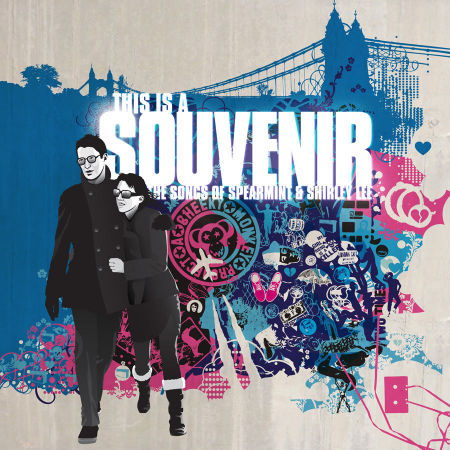 Kieron Gillen and Jamie McKelvie, the writer/artist team who brought us the history-of-Britpop-as-Hellblazer graphic novel Phonogram, have a new project coming out: a graphic novel based on the songs of UK indie band Spearmint, titled This Is A Souvenir.
Kieron Gillen and Jamie McKelvie, the writer/artist team who brought us the history-of-Britpop-as-Hellblazer graphic novel Phonogram, have a new project coming out: a graphic novel based on the songs of UK indie band Spearmint, titled This Is A Souvenir.
2008/11/2
Patrick Farley (of Electric Sheep Comix) has a new work up: Don't Look Back, a gorgeously illustrated and witty slice of neon-lit 1970s prog-rock sci-fi futurism. It's a combination of distinctly retrofuturistic zeitgeists (prog rock/art, stories of spaceships, the freaks-vs.-straights dichotomy), gloriously rendered, and could be described as being like Illuminatus! meets the Hitchhiker's Guide to the Galaxy with artwork by Roger Dean. It's a work in progress (only two parts are up so far), though keep checking back.
2008/9/17
The Sound of Young America podcast has an audio interview with Adrian Tomine, talking at Seattle's Bumbershoot festival about his recent graphic novel, Shortcomings.
(via Boing Boing) ¶ 0
2008/9/2
Google are apparently working on a new web browser. Named Chrome, the browser is designed more like an operating system which happens to be based on web technologies like DOM and JavaScript than a traditional browser; different pages are separate processes (and about time, too) and privileges are compartmentalised to fortify security. Meanwhile, the web rendering implementation is based on WebKit (the Apple/KDE open-source web engine), with a JIT-compiling JavaScript engine optimised for application from a Danish company named V8 (I wonder how it compares to Apple's Squirrelfish and Mozilla's new engine). Alas, there's no code available (and the URL given returns a 404); instead, Google have given us a beautifully drawn 38-page comic by Scott McCloud, illuminating the technical innovations and the reasons for them, in great detail and with no small amount of humour:
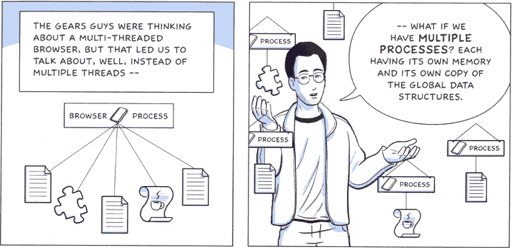
That's all the detail that seems to exist so far. There is a possibility that it's just an elaborate feint; Google could, in theory, have paid McCloud some huge sum to draw a comic to specification, peppered with technical versimilitude, purely in order to send Microsoft/Apple/Yahoo!/whoever's development teams on a wild goose chase. Though I suspect that there is an actual product there. For one, Google are known to use WebKit on Android.
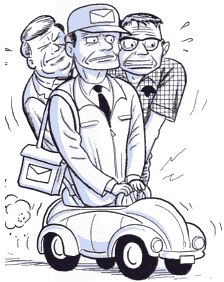 More importantly, though, a browser designed as a web application operating system (with the expectations of performance and stability that implies), rather than an information viewer with programmability grafted on as an afterthought (as is the case with current browsers), would line up rather nicely with Google's strategy to make the web into a first-class application platform.
More importantly, though, a browser designed as a web application operating system (with the expectations of performance and stability that implies), rather than an information viewer with programmability grafted on as an afterthought (as is the case with current browsers), would line up rather nicely with Google's strategy to make the web into a first-class application platform.
There are no details on what platforms Chrome will run; it is open-source (and other projects, or those willing to fork those, will probably have a field day with this), and the comic does mention Windows in one place, so presumably a Windows version is planned. I'm guessing that Google aren't doing this to help Microsoft sell Windows licences, though, so presumably this is not the only version planned. A Linux desktop version, running on top of X, is probably likely. Another possibility is it running over something lighter than the average Linux desktop, making a robust web-browsing appliance on which the browser meets the conventional definitions of an operating system; either Android or some other lightweight OS.
The other option, of course, is that this is an elaborate hoax, akin to the Photoshopped "spy photos" of new Apple Mac tablets and other fantastic gear that are a regular feature of gadget blogs. The fact that Google's Chrome page doesn't yet exist (at time of writing) does suggest this possibility. Though this would imply that the hoaxers had an enormous amount of time on their hands, excellent comic drawing skills and an uncanny mastery of the drawing style of Scott McCloud.
Update: Google have confirmed Chrome. It's initially a Windows product (presumably to win market share before IE8 comes along and shuts off Google's oxygen with its advertising cookie blocker), though Mac and Linux versions are in the works. The Windows version will apparently be out tomorrow.
2008/3/15
2008/2/15
Read: Mister Wonderful, a graphic story by Daniel Clowes, dealing with modern alienation, though this time in middle age.
Interestingly, the PDF files contain the unrasterised line art; when OSX Preview shows the pages, it draws it in layers, first the neat shapes of colour, then outlines and shading, then speech/thought bubbles and text.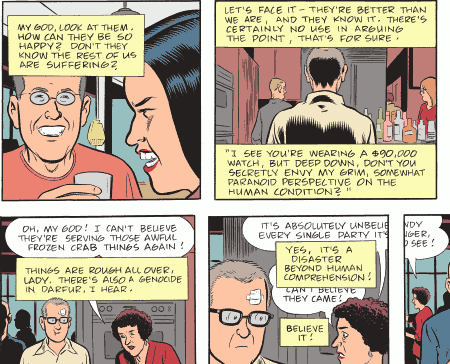
(via Boing Boing) ¶ 0
2007/12/6
2007/10/7
Adam "Ape Lad" Koford, author of The Laugh-Out-Loud Cats has posted a graphical argument against the teaching of cursive writing in schools:
2006/7/10
2006/4/14
This week, Perry Bible Fellowship commemorated the (upcoming) sixth anniversary of Edward Gorey's death by doing a strip in his style:
2006/1/24
The latest addition to the Belle & Sebastian lifestyle-experience empire is a graphic novel. Titled Put The Book Back On The Shelf, it comes out in February (one week before their new album) and features stories titled after (and presumably inspired by) Belle & Sebastian songs, written and illustrated by various sequential artists. The only name that immediately rings a bell is Laurenn McCubbin (co-author of "Lazy Line Painter Jane"), who I think is one of those freaky fetish-goth authors Warren Ellis hangs around with or something, and who also did the cover art. (I was hoping they'd get Daniel Clowes or Dorothy Gambrell or someone to contribute to it, but you can't have everything.)
2005/10/28
If today's Cat and Girl is anything to go by, the chav phenomenon has jumped the Atlantic and they've already got them in New York:
And by the look of it, it seems like they're not talking about middle-class indie-kid Anglophiles adopting British street fashion to distinguish themselves from the jocks and preppies, but actual council-estate-style chavs. Of course, it could well be that Burberry-clad hooliganism in Britain is in the news in the US.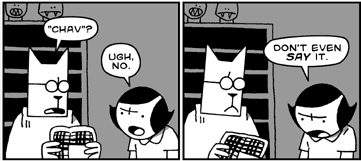
While we're there, this Cat and Girl, from a few weeks earlier, is also really good. A small excerpt:
Meanwhile, Archie Comics, the PG-rated chronicler of American adolescence since the 1960s, goes goth: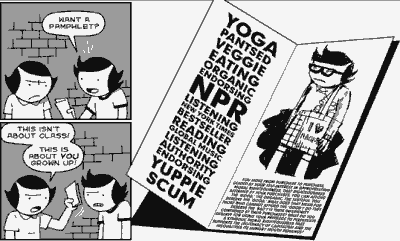
Mind you, Stephin Merritt had the same idea eight years earlier, though he was being ironic.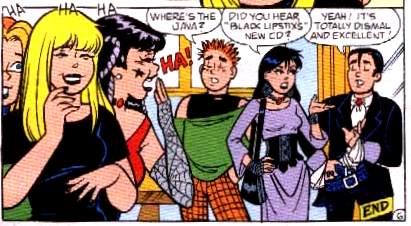
(via Cat and Girl, bOING bOING) ¶ 0
2005/9/21
2005/7/26
Everybody Loves Eric Raymond, a web comic for penguinheads, involving Richard M. Stallman, Linus Torvalds and Eric S. Raymond living in a shared house.
And then there's Buzz Aldrin's Conspiracy Smackdown:
(via bOING bOING, ![]() reddragdiva) ¶ 0
reddragdiva) ¶ 0
2005/5/17
I'm not a huge fan of the This Modern World comic. Perhaps it comes from not living in the U.S., and thus being able to tune out the domestic issues it often covers, or perhaps it's that, more often than not, it tends to smugly preach to the choir and its message can be boiled down to something like "Republicans/neocons/right-wingers are insane, evil doodyheads and they smell, so there". However, the most recent one is a rather keen satire of recent Creationist tactics.
2005/4/26
Veteran underground comic author Howard Cruse reminiscent about the old childhood pastime of raising nancies:
And there are more comics on his site, including one which asks the question of "Why Are We Losing The War On Art?".
2005/4/12
A new comic book from Colombia has Pope John Paul II return as a superhero, donning a cape, a utility belt holding holy water and communion wine and special "chastity pants" and battling the forces of evil. "El Increible HomoPater" (which means "Popeman", and not "Gay Dad") is scheduled to go on sale in Colombia and Poland, to be followed by Popeman action figures. A sample page is here.
2005/3/29
2005/2/18
2005/2/1
2004/12/8
This is very cool; detailed drawings of the skeletal systems of various cartoon characters, including Charlie Brown, Hello Kitty, various Warner Bros. and Hanna-Barbera characters and the Powerpuff Girls, done in 19th-century anatomy textbook fashion, showing the freakishly distorted physiognomies of the characters in question. These are currently being exhibited in an art gallery in Portland, Oregon. Anyway, judging by these drawings, without their cartoonish skin, a lot of these characters would fit in well in glass cases in some Victorian eccentric's wünderkammer. (via bOING bOING/Toby)
2004/3/29
Art Spiegelman, the author of Holocaust graphic novel Maus, has tackled September 11:
"The work is on my feelings towards the hijacking and then the hijacking of the hijacking by the Government. I'm not so sure The New Yorker is being complacent. I'm sure I'd be welcomed back once I had found the right medication."
Spiegelman's new book is sure to cause as much, if not more, ruckus as MAUS. It depicts a government out of control, or, more chillingly, totally in control. "They had an agenda already on their mind before September 11," he says. "Drying up funds for health and education and moving the funds upward to the rich, all made more implementable by the war in Iraq."
2003/11/13
2003/10/14
New World Disorder has some unintentionally brilliant found hip hop lyrics. A representative sample:
we like all you ladies Lookin Sexy with a pepci
So dont look like your pussys tight man you know me
we can do it all night tell the brake of Dawn
But dont get me rong in the morning you got
Leave cause my mother will Bitch at me
Oh, and also via NWD, the latest Trucker Fags in Denial cartoon is up.
2003/9/23
A Softer World is a 3-panel comic strip (for want of a better word) made with digital photographs and overlaid text, and can be beautiful, poetic, poignant and at times twisted and disturbing. A lot like life, really. (via DPH)
2003/9/3
Jenny Everywhere is an attempt at an "open-source" superhero, i.e., a character whom anybody can use in stories. bOING bOING says that this is "like League of Extradorinary Gentlemen without the 75-year copyright interregnum". Which she is, except for the fact that she lacks the makings of a compelling character. She's a little too flawless and politically correct. In fact, some of the Jenny Everywhere comics have the blandly inclusive, committee-designed feel of a community health pamphlet or something.
2003/8/11
The latest instalment of Patrick Farley's mega-doovy webcomic Spiders is up. It's set in the parallel universe where a forward-looking, technologically savvy Gore administration (!) wages war against terrorists with open-source distributed robots and Ecstasy bombs -- only it gets weirder than that. The visuals are amazing, making full use of the web, and referencing everything from Illuminatus! to Fight Club to rave culture (though mostly in the visual style). And it doesn't use one jot of Flash -- it's all inline images. Don't miss it.
2003/8/4
Über-misanthrope Jim "Answer Me!" Goad's new contribution to underground comics: Trucker Fags in Denial, co-authored with Jim Blanchard. With other episodes linked to from here. (Apparently it's soon to be a comic book from Fantagraphics, assuming they don't go under.)
2003/7/22
2003/5/2
An interesting article about Jack Chick, author of numerous Christian Fundamentalist crackpot tracts and ironic inspiration to several generations of underground comics artists, including Daniel Clowes and Robert Crumb.
When Clowes, whose screenplay for the indie film Ghost World received an Academy Award nomination, was in college, he read 80 Chick tracts in one sitting. "By the end of the night I was convinced I was going to hell," he says. "I had never been so terrified by a comic book."
The movie will consist of a series of oil paintings that the camera will dramatically pan across to give the appearance of movement. Carter has completed most of the paintings, which are being stored in the offices of Chick Publications. Fans have encouraged me to try to see them. Kurt Kuersteiner, Web master of the Jack Chick Museum of Fine Art (an online fan site that carries news and reviews of nearly all of Chick's works), describes them as modern masterpieces. "There is this beautiful picture of people languishing in hell, with a dragon's head blowing hot flames," he says.
(Hang on, isn't "Kurt Kuersteiner" an alias used by SubGenius church figure Janor Hypercleats?)
2003/3/17
Indie Rock Pete, a (story-driven) web comic poking fun at indie scenester pretentiousness. (It seems a little sparse on indie/hipster iconography though; no button badges, ironic hot-rodder shirts, black-framed glasses or Converse sneakers or such.) (via Largehearted Boy)
2003/3/3
An interview with Dorothy Gambrell, who draws Cat and Girl and The Four Fours.
DG: Are the proletariat cool? Or is talking about the proletariat cool? I'm interested in culture, in society I have generally found that politics are not nearly as important as politicians claim they are. Unless, of course, Politics starts running around the room waving its arms and shouting incoherently, as it's been doing lately. I haven't considered myself political in the past, but I can see people around me becoming much more political. I wouldn't be surprised to soon find myself among them.
What does bother me are trends disguised as inevitabilities like, say, marriage, or having a full time job. There are lots of excellent reasons to have a full-time job money and stability and getting out of the house - and there are lots of good reasons to not have a full time job - like owning your own time. If you choose to make that trade off, between stability and time, time and money, that's fine, but I do feel that a lot of people never realize that there was a choice to be made.
Incidentally, there won't be any new issues of Cat and Girl for a few weeks, because Dorothy has gone to Australia, of all places.
2003/2/25
Superidol, a new comic-book story by Warren "Transmetropolitan" Ellis, is now online. (via bOING bOING)
2002/8/23
The latest webcomic from e-sheep, the creators of the excellent The Man Guy I Almost Was and Delta Thrives:
The Spiders, set in an alternate universe where the dot-com golden age never ended, and a humanist west under an idealised Al Gore fights the Taliban with open-source robots, benevolent AIs and Ecstasy-laced marshmallow drops. It's a sort of cyberhumanist utopian war on terrorism, diametrically opposed to Bush's secret government and ideology of Biblical Fascism and "total information awareness".
It may not be particularly plausible (for one, I doubt that machine-man Gore would have possibly been anywhere near that cool), but it looks pretty doovy. (via 1.0)
2002/6/24
An absolutely gorgeous 3D-rendered webcomic speculating on what blogs will be like in the distant future. Though in some ways it has that early-90s cyberculture/teledildonics vibe, back when technology was going to bring the singularity and disembodied virtual sex was supposed to be the new LSD or something. Still, for us in the year 2002, living under the threats of Al-Qaeda dirty bombs, home-grown totalitarianism and war without end, and the prospect of a locked-down, censored, end-to-end rights-managed Internet being more a tool of corporate control than personal liberation, it's a nice bit of utopian retrofuturism, a vision of a future from a different timeline. (via rebecca's pocket)
2002/4/13
Web comic of the day: Cat And Girl, which is what it sounds like. Cuter than Pokey the Penguin, and no less philosophical. (via Lukelog)
2001/10/20
2000/12/30
I recently received in the mail Issue 1 of a self-published comic titled The Warstorm, by an outfit calling themselves Chrome Fetus. It is about a God-fearing old man named Henry Carver, whose passion is writing and illustrating a lengthy book he calls Tales of the Lillian Girls (if that sounds familiar, it is because it takes a lot from the story of real-life outsider artist Henry Darger, of Vivian Girls fame). The preview issue of The Warstorm looks pretty interesting; the graphics and writing are impressive (though don't expect Vertigo gloss), and the story itself looks quite interesting. It will be interesting to see how this evolves in future issues.
(Aside: I like the way a bug in the JavaScript implementation of Nyetscape 6 puts those GeoCities ad boxes at the bottom of the page, where you don't even waste consciousness on them.)
2000/7/30
Shutterbug Follies, a pretty nice web comic about a girl who works in a photo developing shop, and some of the things she sees. (via bOING bOING) (I once met someone who worked in such a shop; she saw a lot of amateur pornography, of varying degrees of twistedness, from customers who mostly believed that no-one looks at the photos. Then again, she worked in Prahran.)
